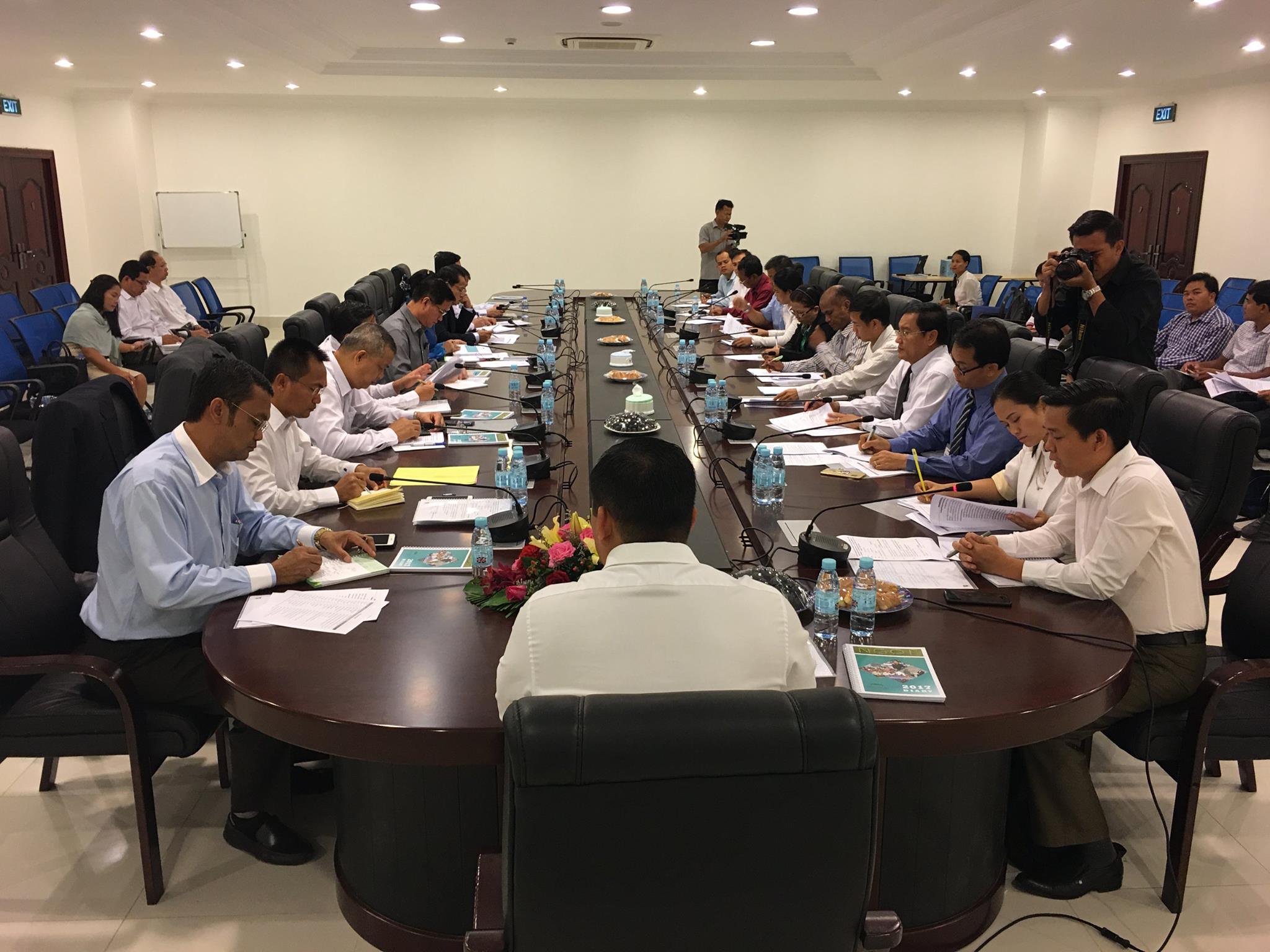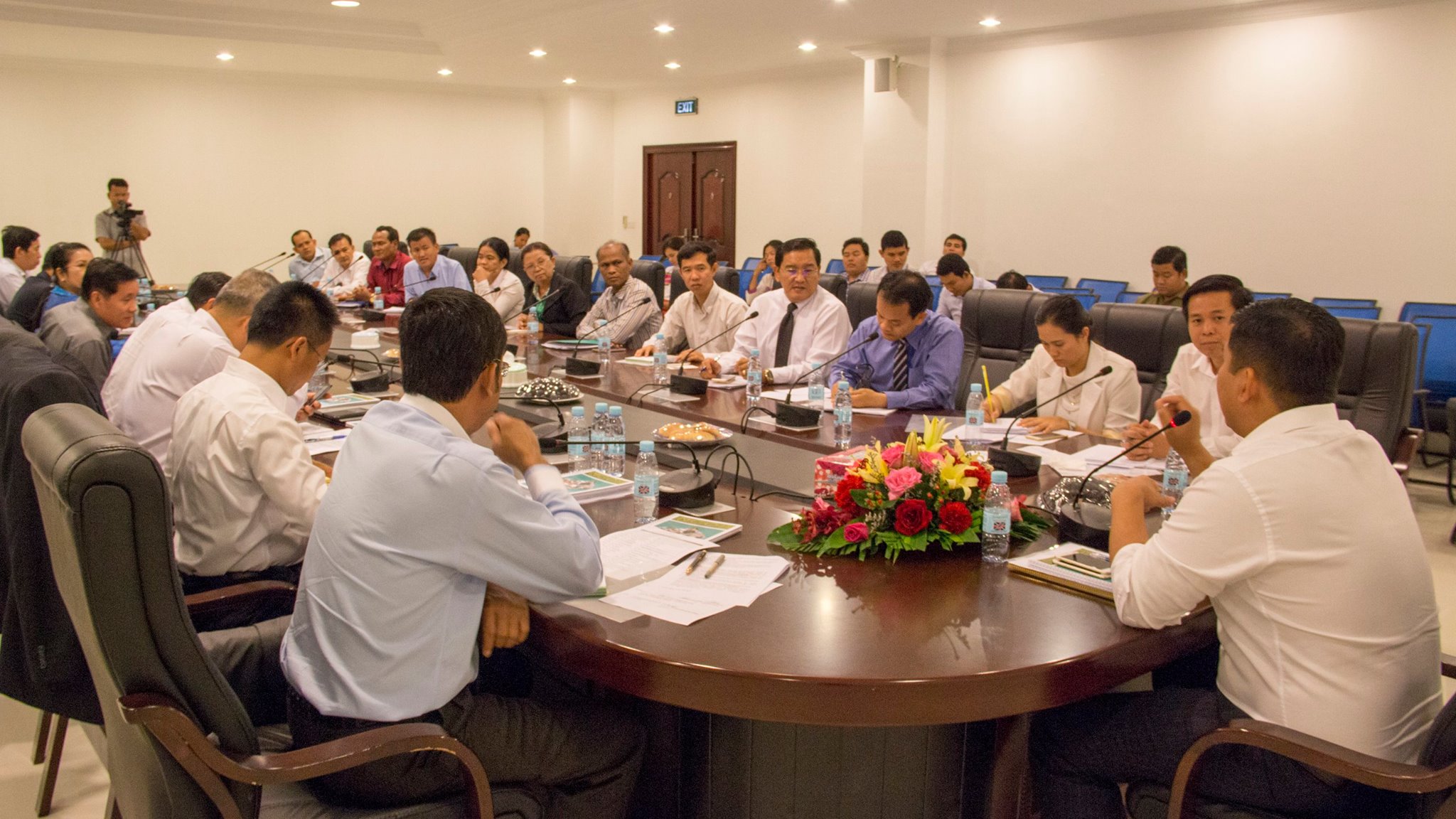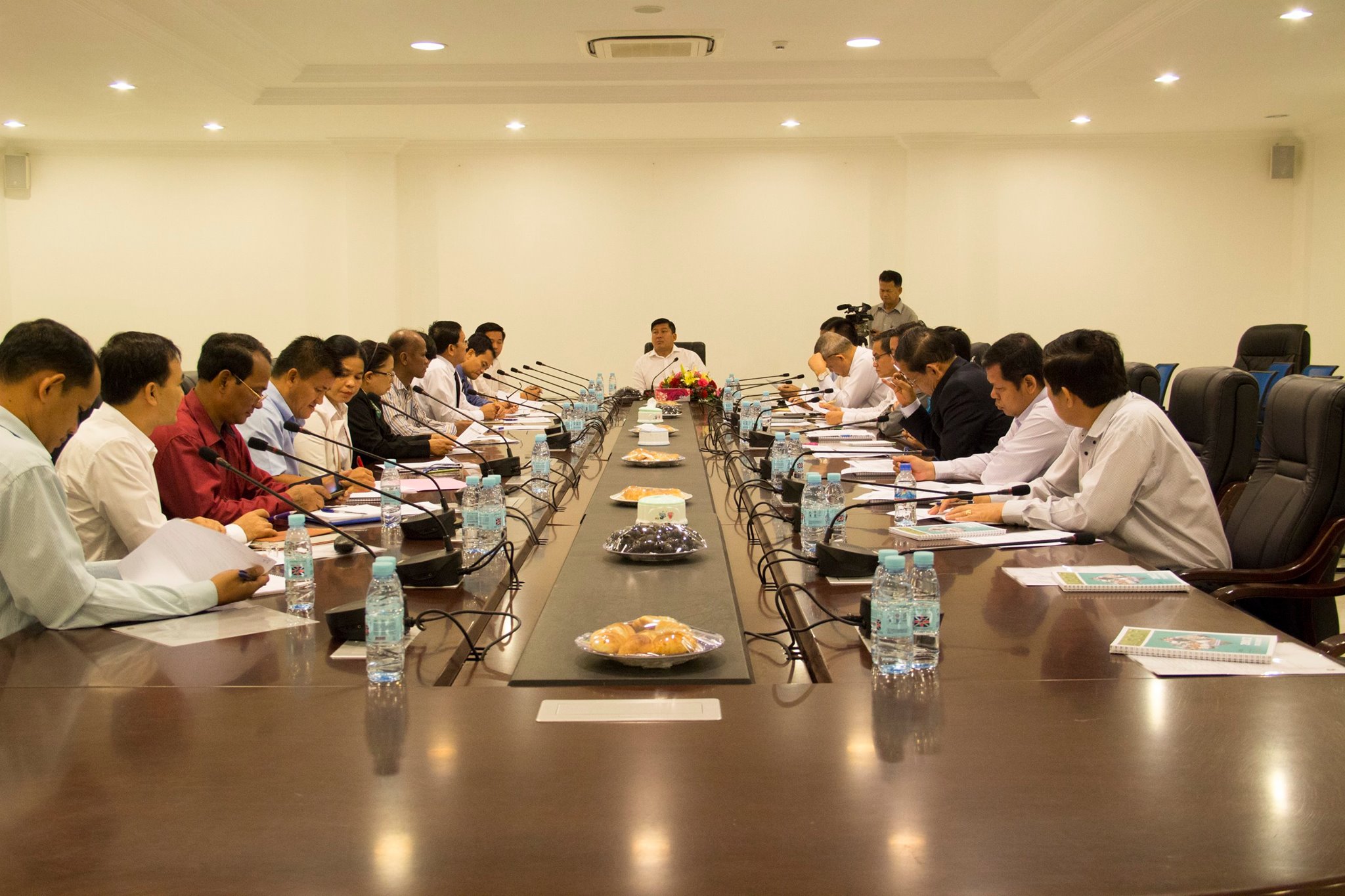
On 20 January 2017, at the Prach Sun Meeting Hall of the Ministry of Environment: a meeting between the Ministry of Environment and representatives of 18 national and international civil society organizations was held. Dr. Tek Vannara, Executive Director, NGO Forum on Cambodia, started by thanking the Ministry for giving opportunity and for invaluable time for the working group of civil society organizations to meet and discuss collaboration in environmental protection, protection and conservation of natural resources, and to present achievements and challenges, and to seek collaboration for 2017 workplan.
Important issues raised in the meeting include: 1) Land conflicts between economic land concession companies and indigenous communities continued to occur and had not been resolved. The Heng Roy, Lan Fen, Roy Fen, Heng Nong, and Heng You companies covered more than 40,000 ha of forested land, and affect 36 villages in the districts of Tbeng Meanchey, Chheb, and Chey Sen, Preah Vihear province and Binch Phuoc 1 Company in Sre Preah commune, Mondulkiri province; 2) Forestry crimes in indigenous areas continue to occur, e.g., in Pu Kung village, Sre Preah commune and Chakchar village, Sre Chhouk commune, Keo Seima district, Mondulkiri province, Prey Rokar and Prey Lang wildlife sanctuary, the Kravanh mountain range areas, under various forms of crime; 3) Forestry crimes in areas transferred from the Ministry of Agriculture, Forestry, and Fisheries to the Ministry of Environment continued to occur; 4) Granting of social land concession affects productive forest, protected forest, spirit forest, burial forest, and reserved forest, and in particular, safety of indigenous communities (the case in Bousra commune, Mondulkiri province); 5) Challenges of effective protection of forestry resources and management of natural resources. At present, natural protected areas of the Kingdom of Cambodia cover a land area of about 7 million hectares; 6) Mechanisms for mitigation and management of disasters caused by climate change affecting agriculture, irrigation, economy, etc. For example, the last drought seriously affected people’s livelihood and fisheries: deaths of about 67 tons of spawning fish in the Tonle Chhmar Lake area, and deaths of livestock in the Ramsa areas of Stung Treng province, etc.; 7) Allocation of financial governance budget for climate change and the environment, in particular at sub-national levels, remained limited; 8) Construction of hydropower dams on the Mekong River mainstream and key tributaries continue while there is no in-depth study of transboundary impacts on water flow, biodiversity, and especially, comprehensive consultations with communities directly and indirectly affected. For instance, the construction of the Xayaburi Hydropower Dam started in 2012 despite clear and strong response from the governments of member countries of the Mekong River Commission against the construction of hydropower dam after consultations. The construction of its second hydropower dam – the Don Sahong Hydropower Dam – started in 2016.
 Moreover, the Lao government is requesting a study of a third project on the Mekong River mainstream, i.e., the Pak Beng Dam. At the same time, the Royal Government of Cambodia is studying the construction of a hydropower dam on the Mekong River mainstream located in Sambor district, Stung Treng province, and Lower Sekong while the construction of the Lower Sesan 2 Dam has been underway; 10) Shortcomings in monitoring companies’ project implementation according to investment contracts and existing regulations. At present, some development projects have not prepared EIA reports yet. Some other companies have prepared EIA reports, but they lacked public participation from directly affected communities and other stakeholders, transparency, and accountability in the operation of development projects, and reporting, providing true and comprehensive information, and people’s decisions remain a challenge that the Royal Government has not addressed. After listening to brief reports by the representatives of civil society organizations, H.E Minister Say Samal requested all partner organization to reflect on the implementation of the spirit of the Forum on Protection and Conservation of Natural Resources held on 22 August 2016, and the Circular No. 05 dated 22 September 2016 on necessary measures for strengthening of management of natural resources. He underlined the progress of implementation of the decisions of the Forum held on 22 August 2016 as follows: 1) Increased joint patrol with local communities in natural protected areas; 2) Recruitment of additional 300 park rangers; 3) Meetings to discuss and address challenges related to natural resource crimes and land conflicts in provinces; 4) Implantation of a pilot project for enhancing communities’ livelihood using national budget; 5) Training to strengthen park rangers’ capacity for effective patrol and law enforcement; 6) Establishment of conservation corridors of biodiversity and natural protected area system covering around 1.4 million hectares of land areas, which would increase size of the entire natural protected area system to about 7.3 million hectares. At the same time, His Excellency Minister also accepted the request for continued collaboration in 2017, and requested that partner organizations implement and address together effectively long-term objectives for local communities as well as the whole national society, especially collaborate to organize the Forum on Protection and Conservation of Natural Resources between stakeholders, civil society organizations and Samdech Prime Minister, which would be held in March 2017.
Moreover, the Lao government is requesting a study of a third project on the Mekong River mainstream, i.e., the Pak Beng Dam. At the same time, the Royal Government of Cambodia is studying the construction of a hydropower dam on the Mekong River mainstream located in Sambor district, Stung Treng province, and Lower Sekong while the construction of the Lower Sesan 2 Dam has been underway; 10) Shortcomings in monitoring companies’ project implementation according to investment contracts and existing regulations. At present, some development projects have not prepared EIA reports yet. Some other companies have prepared EIA reports, but they lacked public participation from directly affected communities and other stakeholders, transparency, and accountability in the operation of development projects, and reporting, providing true and comprehensive information, and people’s decisions remain a challenge that the Royal Government has not addressed. After listening to brief reports by the representatives of civil society organizations, H.E Minister Say Samal requested all partner organization to reflect on the implementation of the spirit of the Forum on Protection and Conservation of Natural Resources held on 22 August 2016, and the Circular No. 05 dated 22 September 2016 on necessary measures for strengthening of management of natural resources. He underlined the progress of implementation of the decisions of the Forum held on 22 August 2016 as follows: 1) Increased joint patrol with local communities in natural protected areas; 2) Recruitment of additional 300 park rangers; 3) Meetings to discuss and address challenges related to natural resource crimes and land conflicts in provinces; 4) Implantation of a pilot project for enhancing communities’ livelihood using national budget; 5) Training to strengthen park rangers’ capacity for effective patrol and law enforcement; 6) Establishment of conservation corridors of biodiversity and natural protected area system covering around 1.4 million hectares of land areas, which would increase size of the entire natural protected area system to about 7.3 million hectares. At the same time, His Excellency Minister also accepted the request for continued collaboration in 2017, and requested that partner organizations implement and address together effectively long-term objectives for local communities as well as the whole national society, especially collaborate to organize the Forum on Protection and Conservation of Natural Resources between stakeholders, civil society organizations and Samdech Prime Minister, which would be held in March 2017.

For more detail information, pleased contact Dr. Tek Vannara, Executive Director of the NGO FORUM on Cambodia. Email: vannara@ngoforum.org.kh